Hey What's Up Sexy What Are Your Rates And Services For Bare?
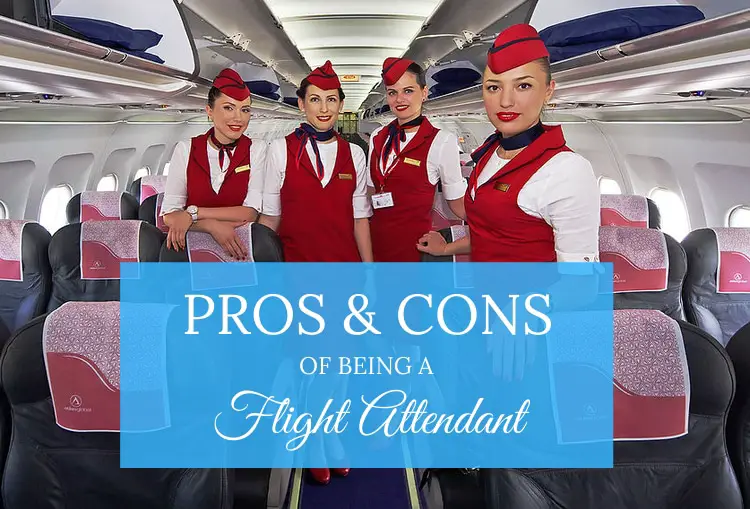
If you're thinking about applying to become a flight attendant, then you've come to the right place for inside knowledge on exactly what this entails when you have got the job and are flying the skies.
I'm going to answer all those questions that you have about being a flight attendant and give you an idea of what being one is actually like.
And to do that, to give you the big picture, I'm going to share with you the pros and cons of working as a flight attendant. I want to help you to understand if this job matches what you are looking for and if this really is the job for you.
| Pros | Cons |
| You get paid to see the world | You miss important events |
| You get flying benefits(Reduced airline tickets) | You spend a lot of time commuting |
| Your friends and family get flying benefits | You're always tired |
| You meet a lot of people and make lifelong friends | You get into bad eating habits |
| You gain people and social skills | The pay when you first start out is low, super low |
| There's no routine, so you'll never get bored | You are often on standby (on-call) |
| You live wherever you want to (sort of) | It's hard to have relationships |
| You pick the lifestyle you want | It's stressful |
| You get a lot of free time | |
| You get cabin crew discount offers |
PROS of being a flight attendant
You get paid to see the world

Basically you get paid to travel. That's the heart of it.
Traveling the world and waking up in a different country or city is an awesome experience that you never tired of!
The length of your stay when on a layover could be from 24 to 72 hours, depending on your airline.
If it's regional or low cost, it's normally a short stopover, but you usually still have enough time to go sightseeing, to explore restaurants, go to the beach or do whatever it is that takes your fancy.
And – this is the really good part – all expenses are included! You have meal allowance to help you cover food costs and your hotel is always paid for, with a minimum category of a 4 or 5 star rating.
As I said, you literally get paid to travel.
You get flying benefits(reduced airline tickets)
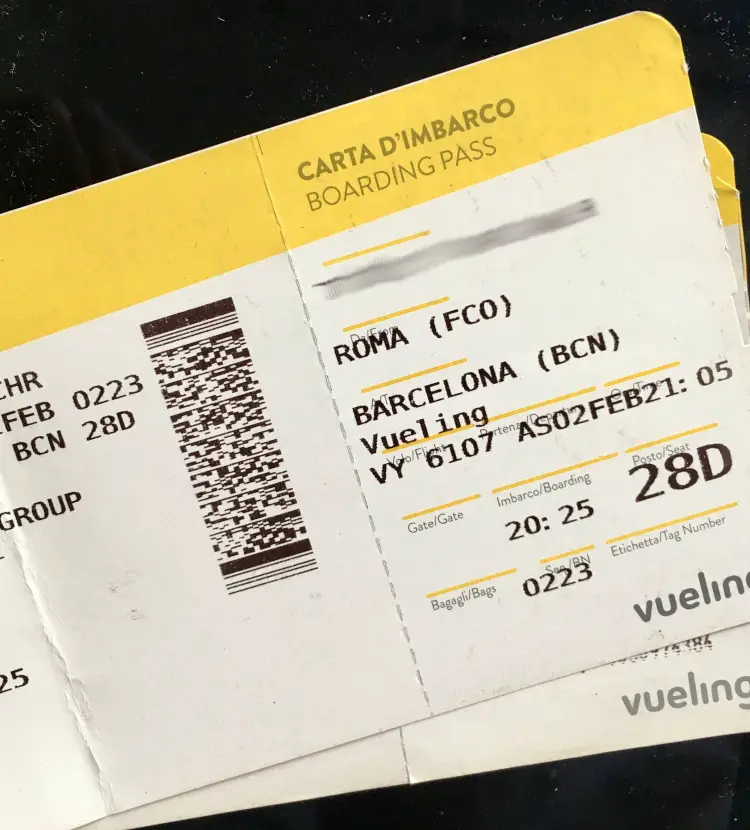
This is a major reason why a lot of people become flight attendants.
You are able to travel anywhere in the world almost for nothing.
With your own airline and on domestic flights, you pretty much fly for free. And for international destinations or with other airlines, you only have to pay airport taxes and sometimes a little bit more.
So let's say you work for Delta Airlines based in Chicago: if you want to go to Hawaii, Virgin Islands, New York, even Puerto Rico, it's free.
And if you want to go to Paris or any other international destination, you only pay the relevant taxes.
Last summer I paid just $117 for my ticket from Miami to Barcelona. The price will vary depending on where you're traveling from, but that's still pretty cool, yeah?
The only downside is that when flying with these tickets (standby tickets), you don't have a guaranteed seat.
If there are empty or unsold seats on the airplane when it's ready to leave, sure, you'll be able to fly.
But If there are no unsold seats, or more people are trying to fly standby than there are seats available, you might not be able to fly and that could make for a bit of planning trouble.
Your friends and family also get flying benefits
This depends on the company.
In the airline I work for, you also get one travel companion and/or your parents.
You meet a lot of people and make lifelong friends
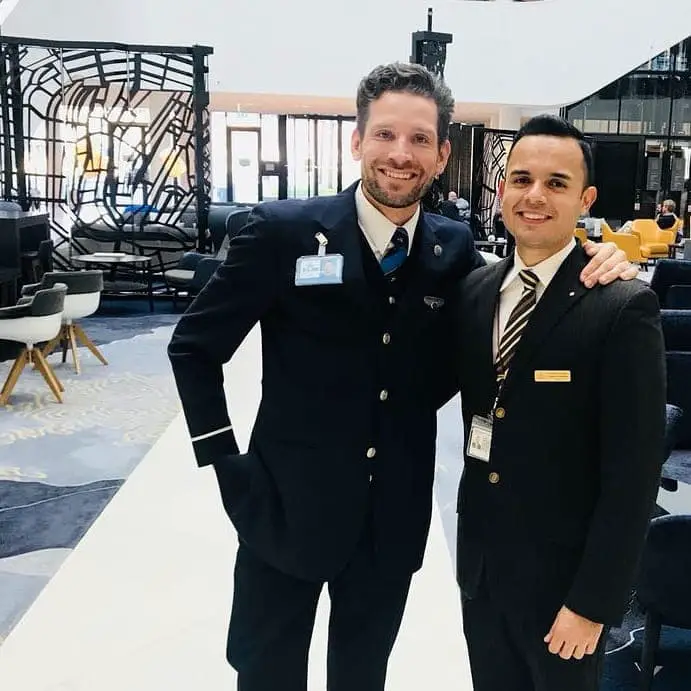
You really do make many friends.
Most of my flight attendants colleagues in my airline are more or less in the same age group as me and we have the same passion for traveling.
We are sociable and outgoing because that's the nature of our work and our personalities.
In my case, since I didn't grow up in Barcelona, all my friends are actually airline friends.
We work together, hang out together after work, and even have shared apartments.
You gain people and social skills
This job is great for learning and improving your social skills.
You're mixing with around 200 to 500 people a day on an airplane, so you need to be able to talk easily to the people you are working with and many of the passengers.
Sometimes you find yourself in a lot of strange, difficult, even crazy, situations that you have to deal with.
And to do that effectively, you learn to listen, communicate effectively, and to be assertive while staying pleasant and polite.
You also learn to interact with all types of people from different cultures, backgrounds, and age groups.
For example, to a 90-year-old granny or a middle-aged businessman or a young Japanese couple you wouldn't talk in the same way, all have their different needs and correct ways of being addressed.
As a flight attendant, you will learn how to do that politely and effortlessly.
There's no routine, so you can't get bored of no routine
Trust me, you never get the same schedule, so you never get bored.
Which is a huge pro or con depending on which flight attendant you ask.
In my case, I have a great schedule where I combine 5 days on with 4 days off. So for me, that's a big pro because my schedule is essentially the fabric of my life.
On this topic: What Do Flight Attendant Typical Schedules Look Like?
And that sort of thing can be a pro for those who can't sit still.
Working 9 – 5 every day in a 9 – 5 cubicle would be horrific and restrictive for us flight attendants.
Our office is the sky!
You live wherever you want to (sort of)
You can live wherever you want, depending on where the bases of your company are located.
But a heads up here; don't get confused about the meaning of the word "base".
The airline base is where you start and finish working from.
Just because an airline is flying to a destination (e.g. Paris), it doesn't mean that they permanently keep aircraft there and so hire local flight attendants in that destination.
The company just flies there so the onboard flight attendants might sleep in that city for one or two nights, but they certainly don't live there.
This is an important thing to understand because each airline has different bases.
So before you apply to any carrier, you need to do your research and make sure that the airline you are trying to work for has bases that you are interested in living in.
For example, even though Delta flies to hundreds of destinations, their bases for flight attendants are:
Atlanta (ATL), Detroit (DTW), Minneapolis (MSP), New York (LGA/JFK), Salt Lake City (SLC), Los Angeles (LAX), and Seattle (SEA).
Other good examples are airlines in the Middle East like Qatar or Emirates, even though they fly almost everywhere in the World, flight attendants are only based in Doha (DOH) or Dubai (DXB).
After training, you can choose between the bases they have (although not all of them will be open or available), and you'll move and live there.
So please be aware of that – you will be based in one city and fly to many others.
You pick the lifestyle you want
Some flight attendants love to have layovers, and if that appeals to you, then I would recommend you to apply for a charter airline or mainline carrier.
But other flight attendants prefer one-day trips and to be able to sleep in their own bed each night. In that case, I'd recommend working for a low budget or regional carrier.
You get a lot of cabin crew discounts and offers
Once you're hired by an airline and have gained a little seniority, you'll be able to personalize your schedule.
That's because most airlines, at least in the US, use a bidding system, which means that cabin crew can bid on their monthly preferences – which days off they want, their preferred routes, etc.
And most senior staff will be given priority on these scheduling choices.
Once you have quite a bit of seniority you can choose if you want to work long or short trips, or if you prefer to have a lot of free time to do whatever you choose. It's all based on seniority.
I personally fly around 13 days a month, sometimes a bit more and sometimes a bit less.
But the number of working days is never certain.
It also depends on your airline and the base.
On average, most flight attendants at the beginning of their working career fly about 18 days a month, but this is different for each case.
That's how a lot of people can work in one city and yet live in another city or country.
I even know pilots that are living in Spain and commuting to the Middle East to work. Their families and homes are in Spain, but because they work only 2 weeks on and have 2 weeks off, they can live like this.
Which isn't a bad lifestyle for those who choose it.
You get discounts everywhere
Airline crews receive a lot of discount coupons for shops, services, hotels, car rentals, and even medical services or spa treatments.
I've been in many luxury hotels that I wouldn't have been able to afford without these crew discounts.
This is a real bonus.
CONS of being a flight attendant
Being a flight attendant is awesome!
Okay, there are some cons, but don't let these discourage you from achieving your dream job.
All of these cons can be addressed and sorted.
You miss important events
You are away from your family and friends a lot and so can miss important events: birthdays, weddings, Christmas, bachelor parties, baby showers.
I've been working 10+ years in my company now and I still can't guarantee to have Christmas off.
Sure, you can request those sorts of dates ahead, but there is no 100% guarantee that you will get them.
In my first year as a flight attendant, I had to work over Christmas. I was a newbie, had a layover in Paris and I thought, "How cool it's gonna be with my crew going downtown. We'll get to see the Christmas markets, the decorations and we'll be having fun spending Christmas day in Paris". But sadly, no. All of my crew were 'slam clickers' (unsociable crew members who prefer to stay in their hotel rooms between flights – they are rare beasts, but they do exist), and I had to spend my first Christmas away from home, crying in my room alone. It sucked. But my next Christmas was great, so it's not always like that.
You'll spend a lot of time commuting
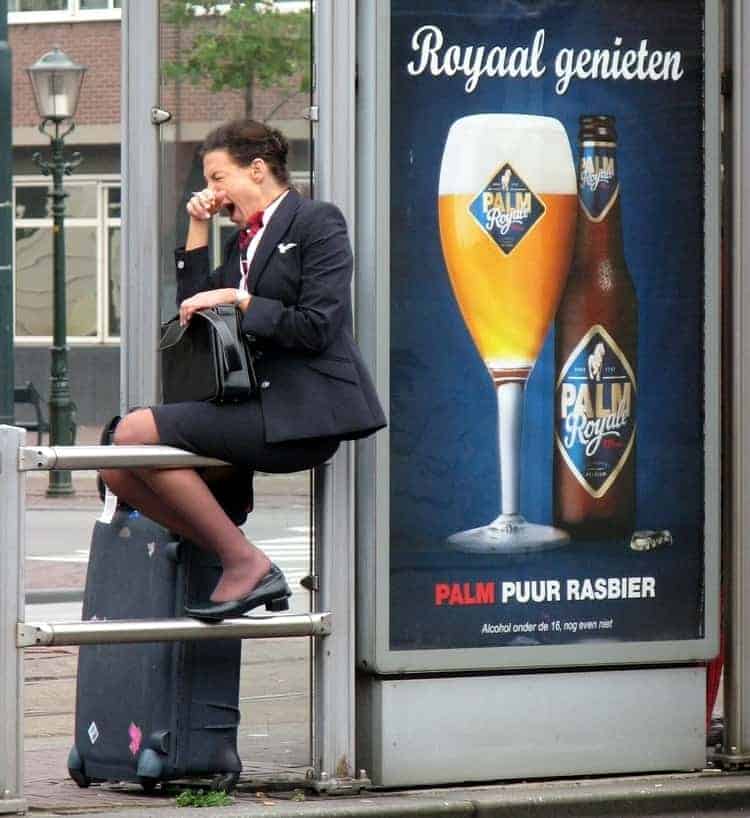
If the base that you want to have is not open (available), then you'll be based in another city and you either need to move to that city or commute to it.
If you do pick commuting, then you're going to spend a lot of time just getting to work.
And you are usually using a standby ticket, so there can be a lot of stress worrying about whether you're going to be able to fly or not.
Always remember that it's your responsibility to be at your base on time, on the day you have to work.
You're always tired

Working in the air is much more tiring than working on the ground.
If just flying as a passenger on a plane can make you feel terribly tired, imagine how you'd feel if you had to work on one for 12 hours non stop.
If you are flying from one country to another it's very tiring and there are moments when you're not even sure where you are anymore.
And all of that without mentioning the jet lag. Sorry folks, but I've got no special tricks for overcoming this one.
You get into bad eating habits
Eating on the plane is not good at any time, and eating airplane food is the worst.
You're gonna gain a lot of weight in your first year, simply because you ate airplane food and convenience foods like McDonald's.
Plus the food we eat on the plane is not the healthiest. It's processed, very salty and it contains a lot of sodium. And even though it can fill you up fast, it doesn't contain much in the way of nutrients. They are low in vitamins, minerals, and fiber.
The meals are generally prepared by ab large catering factory from 12 hours to 72 hours beforehand, they are never fresh. And they have a lot of preservatives and hydrogenated vegetable oils (they are high in trans fats).
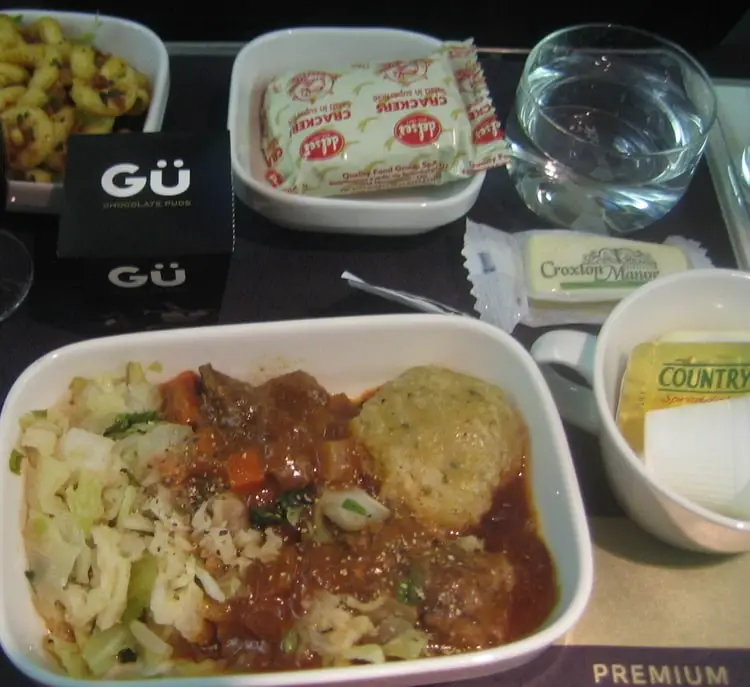
I try to pack my own food whenever I can. Partly because I'm vegetarian, but mainly because this way I know exactly what I'm eating.
We also can feel constantly bloated, I don't know if you've ever noticed, but when you're on the plane the bags of chips or water bottles can pop open?
That's due to the lower air pressure in the cabin and your body is undergoing the same forces as those bottles of pop and bags of chips.
The pay when you first start out is low, super low
Although you get a pay raise when you progress to the next level of flight attendant, your first year can be super hard, both financially and emotionally.
You're always on reserve (on-call) and you don't fly much, just the bare minimum, or you do fly a lot but you don't get paid much anyway.
It's a bit of a no-win situation.
So you became a flight attendant because you wanted the glamorous lifestyle and all that comes with it?
But it isn't exactly panning out how you thought?
At least, not at first. You don't have enough money and you are sharing a crashpad (an apartment where several crew members pitch-in for rent in your base city), eating peanuts, pretzels, and leftovers from the plane.
The start out paychecks are not going to give you that glamorous lifestyle you at first imagined, but things really do improve as you move further into your career.
On this topic: How much do Flight Attendants make?
You are almost always on standby (on-call) at the beginning
You can be on reserve, or, as some airlines call it, "standby duty", for a day, for a month, and in some cases, even for years. Especially in airlines in the US.
That means you are at the company's beck and call.
You don't know where you are going to go, when are you going to finish, what you're going to do and you have zero control over your schedule or your time.
You have to face the fact that when you first start out, and even beyond that, you are going to be on reserve.
Let's say, for example, that you are based in Chicago and you live 10 miles away from the airport, you're on standby and your friends call you to hang out, to maybe go to the movies or to a restaurant.
You can't go, you're on standby.
So you sit and chill at your crashpad, waiting for a call that may or may not come.
Making plans when you are on standby is pretty much impossible.
It's hard to have relationships
Not only being a flight attendant is sometimes tough, but also dating as a flight attendant is as well.
You can't plan anything because you don't know when your schedule is coming out, or you are on reserve all the time.
It can be difficult for your partner to understand that you are going to be gone for 4 or 5 days at a time and that you only have 2 to 4 days off in between trips.
In my case, I'm lucky enough to be dating somebody who works remotely and who actually understands me and my job. I wouldn't change him for the world. No way, he's a keeper.
It's stressful
Limited-time, limited space, limited resources, safety norms that don't allow for short cuts even during service, boarding, and other procedures, multi-tasking, passenger issues and complaints, shortage of stock, delays, medical emergencies – there's a whole raft of challenges facing the flight attendant.
But it certainly makes you a more resourceful and smarter person…
Wrap up
In my opinion, there is nothing like being a Flight Attendant, it's the world's best job ever. So, if you enjoy meeting people and traveling, go for it!
Even if it's just for a short period of your life, try it.
I wish you all the best in your new career flying the skies. Bon voyage!
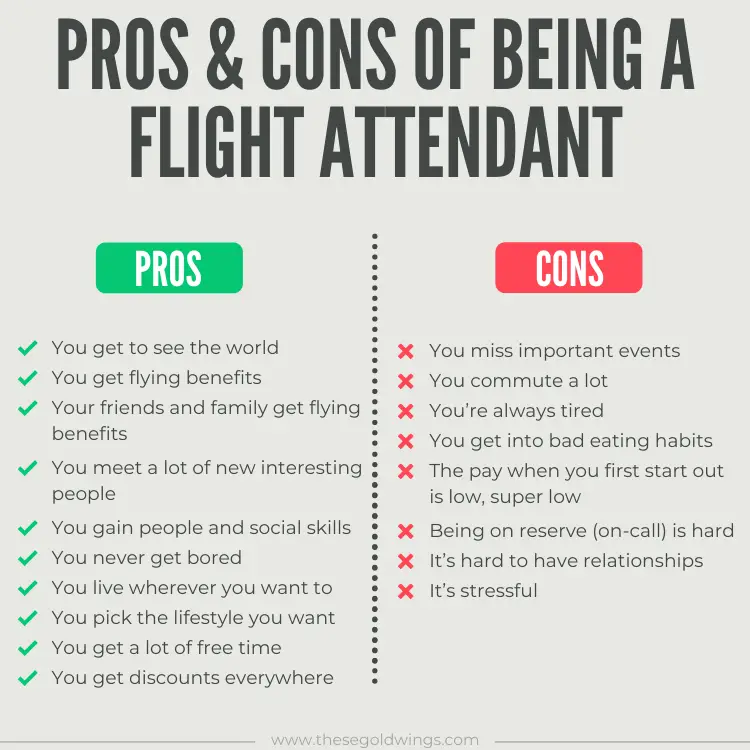
Hey What's Up Sexy What Are Your Rates And Services For Bare?
Source: https://www.thesegoldwings.com/pros-cons-flight-attendant/
Posted by: rosaalent1945.blogspot.com

0 Response to "Hey What's Up Sexy What Are Your Rates And Services For Bare?"
Post a Comment